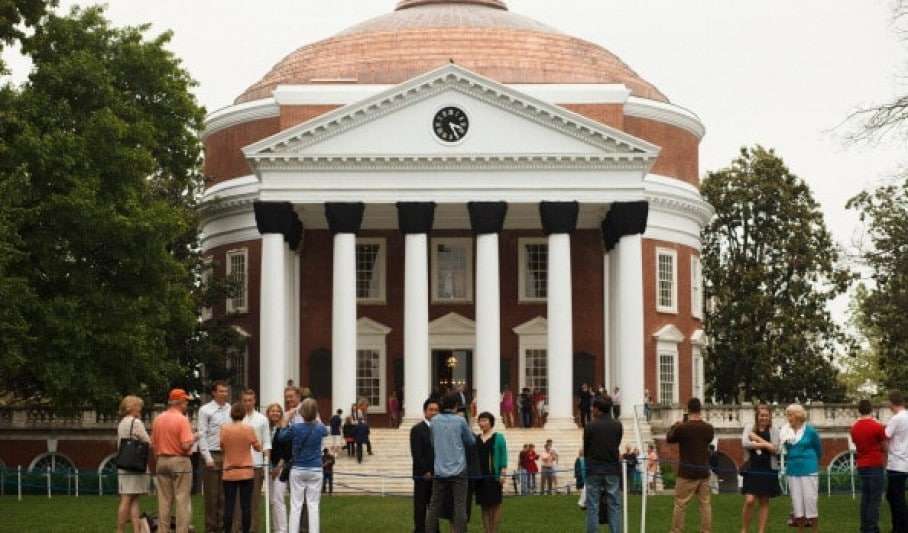The Volokh Conspiracy
Mostly law professors | Sometimes contrarian | Often libertarian | Always independent
No, UVA has no libel claim against Rolling Stone

Some readers of the Libel law and the Rolling Stone / UVA alleged gang rape story post asked: If the story was indeed false, could the University of Virginia sue for the damage to its own reputation (quite apart from the possibility that fraternity members, the fraternity, or the officials named in the story could sue)?
The answer is clear, and it's no. New York Times Co. v. Sullivan (1964) famously held that government officials can prevail in defamation lawsuits only if they can show that the defendant knew the statement was false, or was reckless about the possibility of falsehood - but it also, less famously, held that government entities can't sue for defamation, period, regardless of the defendant's mental state:
For good reason, "no court of last resort in this country has ever held, or even suggested, that prosecutions for libel on government have any place in the American system of jurisprudence.
"[P]rosecutions for libel on government," the Court repeated in Rosenblatt v. Baer (1966) - in a context that covered lawsuits and not just criminal prosecutions - are something that "the Constitution does not tolerate in any form." And the Virginia Supreme Court echoed this in Dean v. Dearing (Va. 2002). So even if someone deliberately lies about the University of Virginia, and this lie damages the university's reputation, the university can't win a libel lawsuit against the person.
Now if someone says about a private university that it doesn't adequately protect its students (because it doesn't adequately investigate alleged rapes and thus doesn't do enough to prevent future rapes), that might be a libel of the university. Compare Mzamane v. Winfrey (E.D. Pa. 2010) (that's the Winfrey), which holds that an allegation that a junior high school principal doesn't do enough to investigate alleged abuse of students could be defamatory; I think a similar allegation about a university official could be defamatory of that official, and of the university more broadly, in the right circumstances.
Likewise, even apart from a claim of culpable lack of investigation, if someone says there was a serious crime against a patron of a particular establishment - whether a bar, a hotel or a university - and the speaker knows the statement is false or recklessly disregards the risk of falsehood, that might be the tort of "injurious falsehood." (This could also be labeled a form of the "trade libel" tort, but as to quality of services and not quality of goods.) The Restatement (Second) of Torts § 623A provides that,
One who publishes a false statement harmful to the interests of another is subject to liability for pecuniary loss resulting to the other if
(a) he intends for publication of the statement to result in harm to interests of the other having a pecuniary value, or either recognizes or should recognize that it is likely to do so, and
(b) he knows that the statement is false or acts in reckless disregard of its truth or falsity.
Under the right circumstances, reporting that there was a particular rape at or near a private university, knowing the statement was false or reckless about the possibility of falsehood, might thus be actionable on this theory as well.
But none of this matters here, because the University of Virginia is a public university, and like other public entities - police departments, government-run ski resorts, cities, counties, states or the federal government itself - it cannot take advantage of the libel claims that are available to nongovernmental organizations.
For more on the possibility of lawsuits by the fraternity members or the fraternity, and for a bit more on the possibility of lawsuits by university officials, see this post.
UPDATE: Some commenters conclude that (to quote one), this is "[p]robably why RS lawyers let them run a story with such shoddy reporting." I don't think that's right; as I noted in my earlier post, there is substantial risk of defamation liability in suits by students or even by the fraternity itself; I doubt that the fact that one possible plaintiff (the University of Virginia) is out of the picture would have materially affected Rolling Stone's judgment.
Indeed, given that Rolling Stone and Sabrina Rubin Erdely were willing to face the huge reputational risk raised by the story - risk that can't be mitigated through libel insurance, the way litigation risk could be - I suspect that they were just true believers: They thought that Jackie's story must be true, and the risk of defamation liability didn't play a major role in their analysis. But in any event, I doubt they would have seen much difference between the risk of a lawsuit from the students, the fraternity, and university officials and the risk of a lawsuit from the students, the fraternity, university officials, plus the university itself.


Show Comments (0)